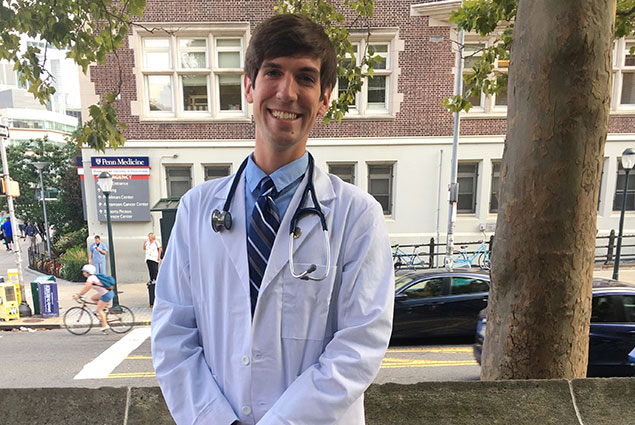Making World-Changing Progress through Cancer Immunology Research

Jordan Harris, BS, Chemical Engineering, 2017, had a simple goal: Take advantage of Northeastern’s College of Engineering education and experience to gain access to a graduate program to render his opportunities in science and engineering virtually limitless. Graduating with a 4.0 GPA and being accepted into many dual MD/PhD programs, Harris is on target for achieving his bold ambition.
He started at Northeastern in chemical engineering working early on in research in the Advanced Drug Delivery Lab under Professor Rebecca Carrier, chemical engineering. At the time, he thought he’d like to wind up in a PhD program related to tissue engineering or molecular biology. His three co-ops, though, helped him realize a tremendous interest in medical research and immunology. As a result, he’s now at the University of Pennsylvania earning a dual MD/PhD degree, hoping to run his own lab where he can do research and practice medicine simultaneously as a physician-scientist.
At Selecta Biosciences in Watertown, Massachusetts, his co-op was related to immunology and applying nanomedicine to manipulate the immune system to increase immunogenicity in response to pathologic antigens or tolerance to prevent the formation of anti-drug antibodies. “This first co-op was the catalyst to changing my career goals to medicine,” he said.
His second and third co-ops confirmed his interest sparked by the first. At a program called CanCURE, in which students are placed with cancer nanomedicine labs in the Boston area to do research and work with a mentor, he took on an independent project working with nanoparticles for mitochondrial drug delivery in prostate cancer. With this work, he was recognized as a finalist in the national AIChE Intern Student Competition.
Then he joined Moderna Therapeutics in Cambridge, Massachusetts. “Basically, they use nanomedicine to encapsulate messenger RNA for a wide variety of purposes, including vaccine development, personalized cancer treatment, and treatment of protein deficiencies.” He found their research platform so interesting that he stayed on for an extra two months after his six-month co-op term concluded. “They helped me take the research experience to a new level and dig deep into the minutiae of science to fuel new technology and help build medicines,” he said.
Upon completion of his program at UPenn, Harris will have both a PhD and an MD, allowing him to run a lab and see patients in clinic at the same time. “I hope to use the research in my lab to fuel my work with patients, and vice versa,” he said. “My work with patients can guide my decisions in the lab.” Most interested in cancer immunology, Harris hopes to be able to make world-changing progress in that area.